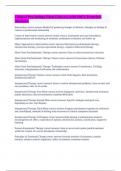Clinical Psychology Final UIowa || with 100% Errorless
Answers.
Intervention correct answers Method of producing changes in behavior, thoughts or feelings in
context of professional relationship
Course of Intervention correct answers Initial contact, Assessment and case formulation,
implementation and monitoring of treatment, termination evaluation and follow up
Major Approaches to Intervention correct answers Short-term psychodynamic therapy,
interpersonal therapy, process-experiential therapy, cognitive-behavioral therapy
Short-Term Psychodynamic Therapy correct answers Aims to make unconscious conscious
Short-Term Psychodynamic Therapy Tenets correct answers Unconscious motives, Defense
mechanisms
Short-Term Psychodynamic Therapy Techniques correct answers Transference, Tackling
resistance, Interpretation clarification and confrontation
Interpersonal Therapy Themes correct answers Grief, Role disputes, Role transitions,
Interpersonal deficits
Interpersonal Therapy correct answers Aims to resolve interpersonal problems, focus on here and
now problems, lasts 12-16 weeks
Interpersonal Therapy First Phase correct answers Diagnostic interview, interpersonal inventory,
patient education, clinical formulation of patient difficulties
Interpersonal Therapy Second Phase correct answers Specific strategies and goals vary
depending on time, role disputes
Interpersonal Therapy Third Phase correct answers Progress and mastery experiences reinforced
and consolidated, methods of dealing with recurrence of clinical symptoms discussed
Interpersonal Therapy Techniques correct answers Role playing, communication analysis,
encouragement of affect, exploration of options and decision analysis, clarification, supportive
listening
Process-Experiential Therapy correct answers Aims to access and explore painful emotions
within the context of a secure therapeutic relationship
Principles of Emotional Change correct answers Increase emotion of awareness, express
emotion, enhance emotion regulation, reflect on emotion, transform emotion
, Cognitive-Behavioral Therapy Tenets correct answers BT: problem behaviors are learned
CT: cognitions mediate between environmental events and behavior/emotion
Cognitive-Behavioral Therapy correct answers Aims to modify maladaptive and cognitive
patterns, focus on present functioning, lasts 12-16 weeks
Cognitive-Behavioral Therapy Behavioral Techniques correct answers Behavioral activation,
relaxation training, exposure therapy, problem solving, social skills training, contingence
management
Cognitive-Behavioral Therapy Cognitive Techniques correct answers Identify distorted
cognitions, challenge and replace irrational cognitions
CBT for Panic Disorder correct answers Education and monitoring, breathing skills, thinking
skills, exposure, planning for the future
Evaluation of Interventions Key Questions correct answers Does treatment work, how does
treatment work, under what conditions does treatment work
Randomized Controlled Trials correct answers Random assignment to treatment and control,
control group possibilities, multiple time points of assessment, careful selection of homogeneous
sample, careful selection of outcome measures, treatment highly standardized, extensive training
and supervision of therapists
Efficacy Studies correct answers Control types of clients in study, standardize treatments,
randomly assignment to patients to treatment and control, prioritize internal validity
Effectiveness Studies correct answers Seek representativeness of clients, therapists, treatment
context, etc, Prioritize external validity, may not include control groups or random assignment,
"benchmarking strategy" of evaluation
Meta-Analytic Studies correct answers Integrate/combine outcomes of large number of carefully
selected studies, average effect size gives overall magnitude of effect for particular treatment,
substantial variability in effect sizes allows examination of moderators of effect
Influences on Treatment Outcome Common Factors correct answers Shared features of most
therapy approaches associated with positive treatment outcome
Influences on Treatment Outcome Client Characteristics correct answers More severe less
positive outcome, presence of personality disorder less positive outcome, positive treatment
expectations more positive outcome, sex unrelated
Influences on Treatment Outcome Therapist Characteristics correct answers Empathy more
positive outcome, emotional well-being more positive outcome, experience not related




